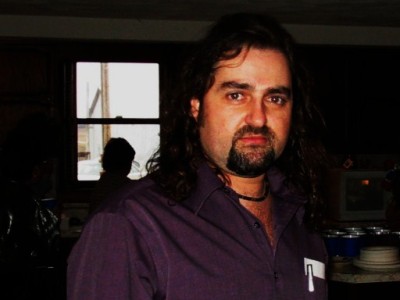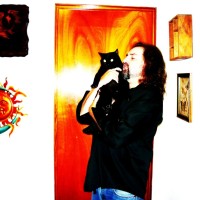Years ago at SIU I wrote a one-sentence story for Ricardo Cortez Cruz’ class, and I used the same form, as well as the tone and some of the content, from that assignment for “Dear Editor.” But the two people at Carbondale who helped me the most, as far as turning me on to what I should be reading and helping me see how I should be thinking about my own work, were Kent Haruf and Rodney Jones. Also, working for Jon Tribble and Allison Joseph at Crab Orchard Review was a great experience. Even before all that, Jerry Bayne was very helpful, publishing some poems and one of my first stories in Wabash Valley’s lit-mag Interpretations.
Lately I’ve been experimenting more with various forms. A few short-short chapters from a novel I just finished were published as individual pieces – the one page story “Me & Nola” in Marco Polo Arts Mag and “Day-Planner,” which is written as a schedule, in Temporary Infinity Press. I like playing around with different forms of fiction and music to see and hear what works the best, or at least see what’s possible.
In terms of your creative process, do you find that your short fictions more or less come to your mind in completed form, or do you tend to start off stories then let them wander to see where they will go?
In my mind the fiction and the music are the same, both somehow part of one big project. As a teenager I used to write song lyrics and weird poems and quirky little scenes and stories, mostly for my band members and other friends. Even then sometimes poems became stories or songs—one thing evolved into something totally different—so you never know what might happen.
“Out There—Eternal” began as a poem, though it somehow became this twisted, almost telepathic letter that took off in its own direction. As cheesy as it sounds, “Where’s My Cat” was actually a dream. Later I added the Mother sections to make it more Psycho-ish, kind of an homage to my mom who turned me on to all those Hitchcock films… and a lot of great music. “And When I Awoke” is a true story and “Pickle-loaf” is what it is.
You are an accomplished musician, too. How is it to have worn both hats—that of a writer/performer of music and of a creator of literary works? How do you divide your time between them?
I usually have several things going at the same time, which sometimes gets in the way, but at least it keeps me from getting in a rut. I’ve played gigs as a drummer since I was fourteen, and I still love it. I also love writing/recording original music. The last few years I’ve been performing more solo acoustic gigs, just vocals and guitar, and now I’m involved in a new experimental band called Thirst that I’m pretty excited about. I guess the gigs are the more social side of writing. You know, you can’t just stay locked up in a room by yourself all the time or you’ll end up writing weird little stories about your cat.



